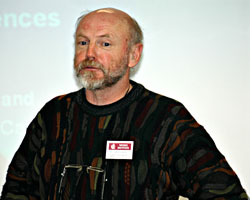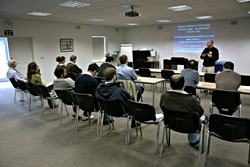 Professor Henning Bjornlund from the University of South Australia and the University of Lethbridge in Canada recently visited the Wessex Institute of Technology to present a lecture on 'Increased market participation in a rural water market – some Australian experiences'.
Professor Henning Bjornlund from the University of South Australia and the University of Lethbridge in Canada recently visited the Wessex Institute of Technology to present a lecture on 'Increased market participation in a rural water market – some Australian experiences'.
Henning referred to the many problems affecting the possession of water resources all over the world and the need to develop sustainable policies. It is important to involve the community in all these projects and find appropriate ways of managing by cost.
There has been a shift from supply to demand management, and in how water is relocated between competing users. This has raised the question as to whether water should be considered an economic or social good.
Since 1993, following the Rio Convention and the World Bank policy document, water is seen as an economic good, so its price should reflect the full cost of supply. Environmental needs must also be addressed. 80% of water is used in agriculture and it is important to keep this in mind. Hence an important consideration is how to use agricultural water more effectively, i.e. find better ways of irrigating the land. A difference should be made between efficient and inefficient users, rather than think in terms of the water rights being connected to the land It is necessary to divorce land per se from irrigation rights.
This leads to the need to introduce markets, a concept that seems contrary to social and cultural values in many countries. Changing the system will require considerable institutional structures to administer the new water markets. Issues such as community concerns need to be addressed as water is essential to the whole economic system of the community.
The experience of USA has been negative in many respects, with places like Los Angeles buying the water rights for whole regions, leaving the farmers in those over areas short of water.
Henning referred to the experience of Australia's largest irrigation district with 68000km² of entitlement. Two types of entitlement operate there, both water rights nearly 100 years old, and sales of water rights. They have two main supply systems with different allocation levels, products and soils. This is administered by public and private irrigators.
Water trading in the Murray and Goulbunn irrigation systems district started earlier on with several changes in the allocation following a drought in 1997. Trading between states is now allowed and soil changes took place regarding water exchange and allocation policy. Nowadays the new entitlement policy is starting to have a real impact on how water is allocated. Wine districts for instance are able to buy the water at a higher price. The trading in these regions also indicated a move of water rights from poor soils (low value trade) to rich soils (high value trade).
Henning concluded by explaining that in the beginning the trade was active only where trade-offs were the biggest. In other areas the adoption of trading was eventually triggered by scarcity due to drought and policy changes. During 2003/04, 60% of all farm business had traded water. By 2004, 85% of all farm business had traded. Larger irrigators were far more active than small irrigators.
The water trading has presented overall benefits for the small farmers as well. The increased value of water has allowed these to stay working the land and thus benefit economically.
The lecture was followed by a lively discussion with many questions from WIT students and staff.


 Wessex Institute
Wessex Institute